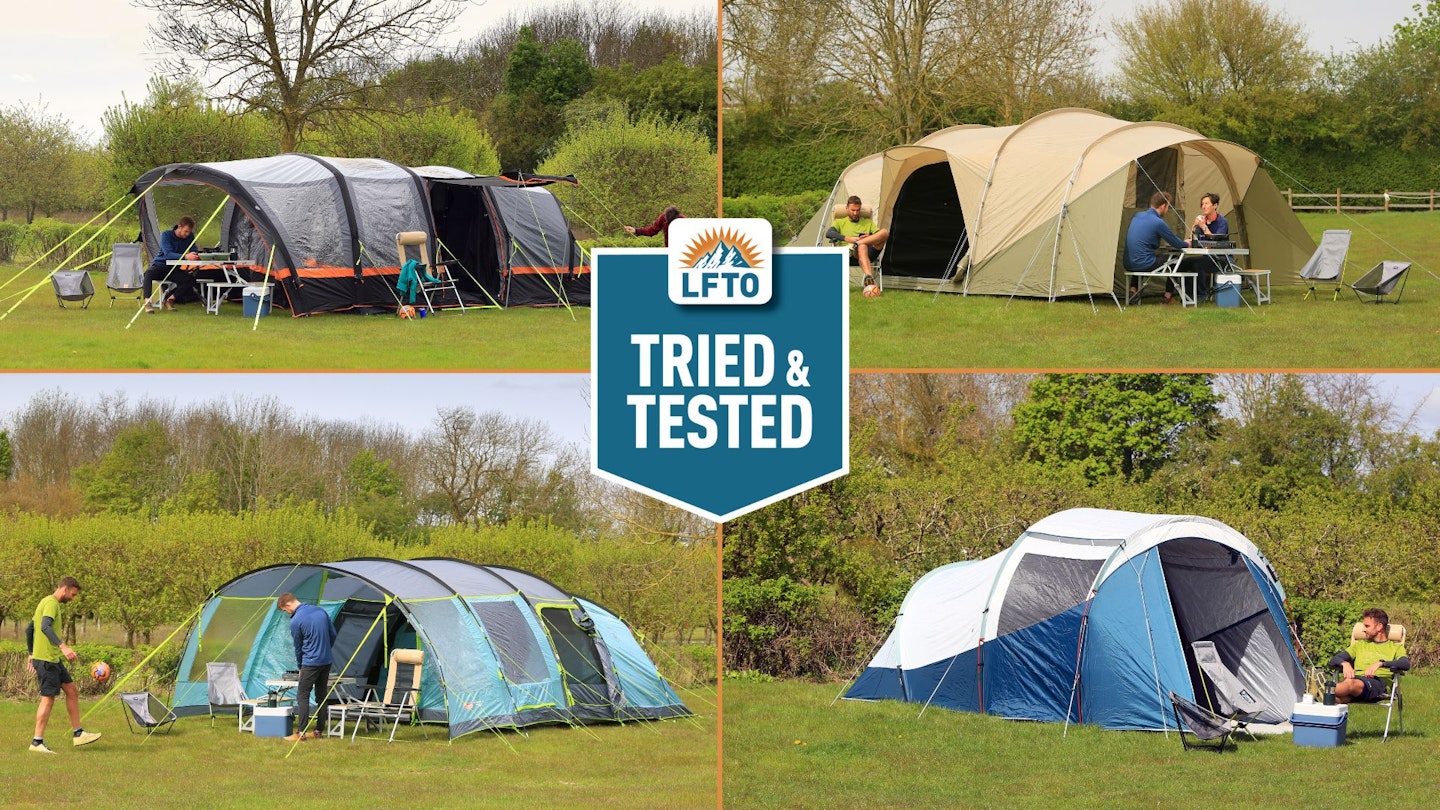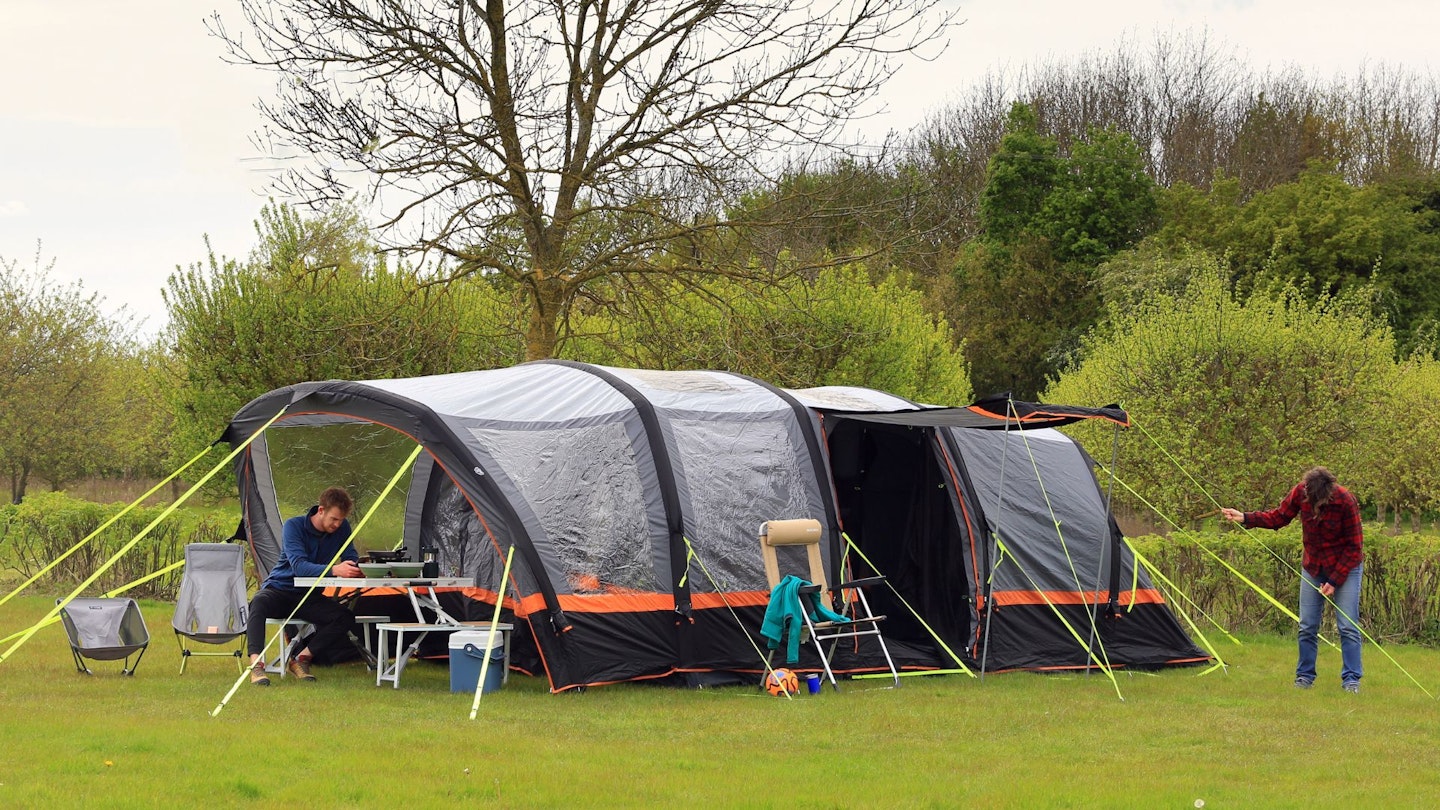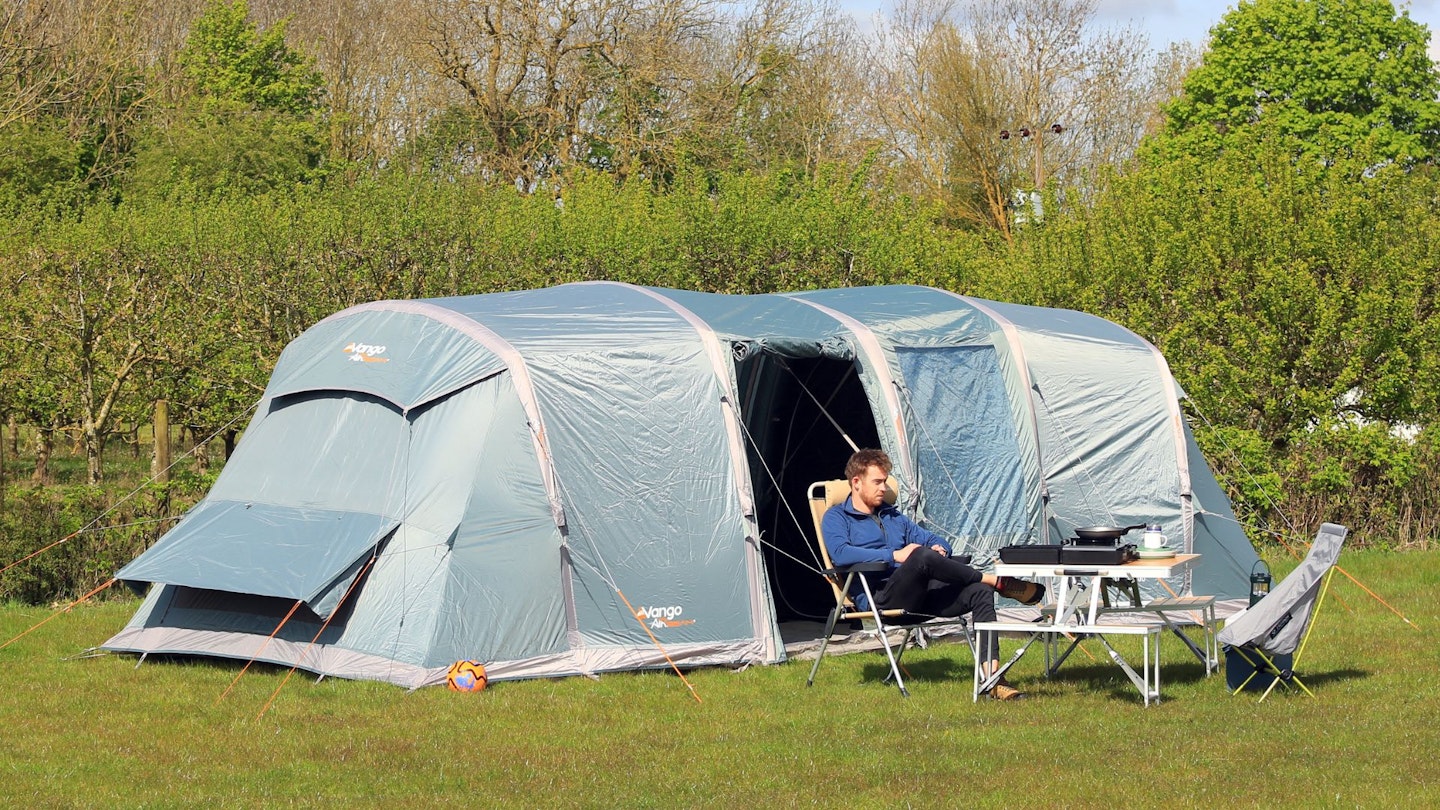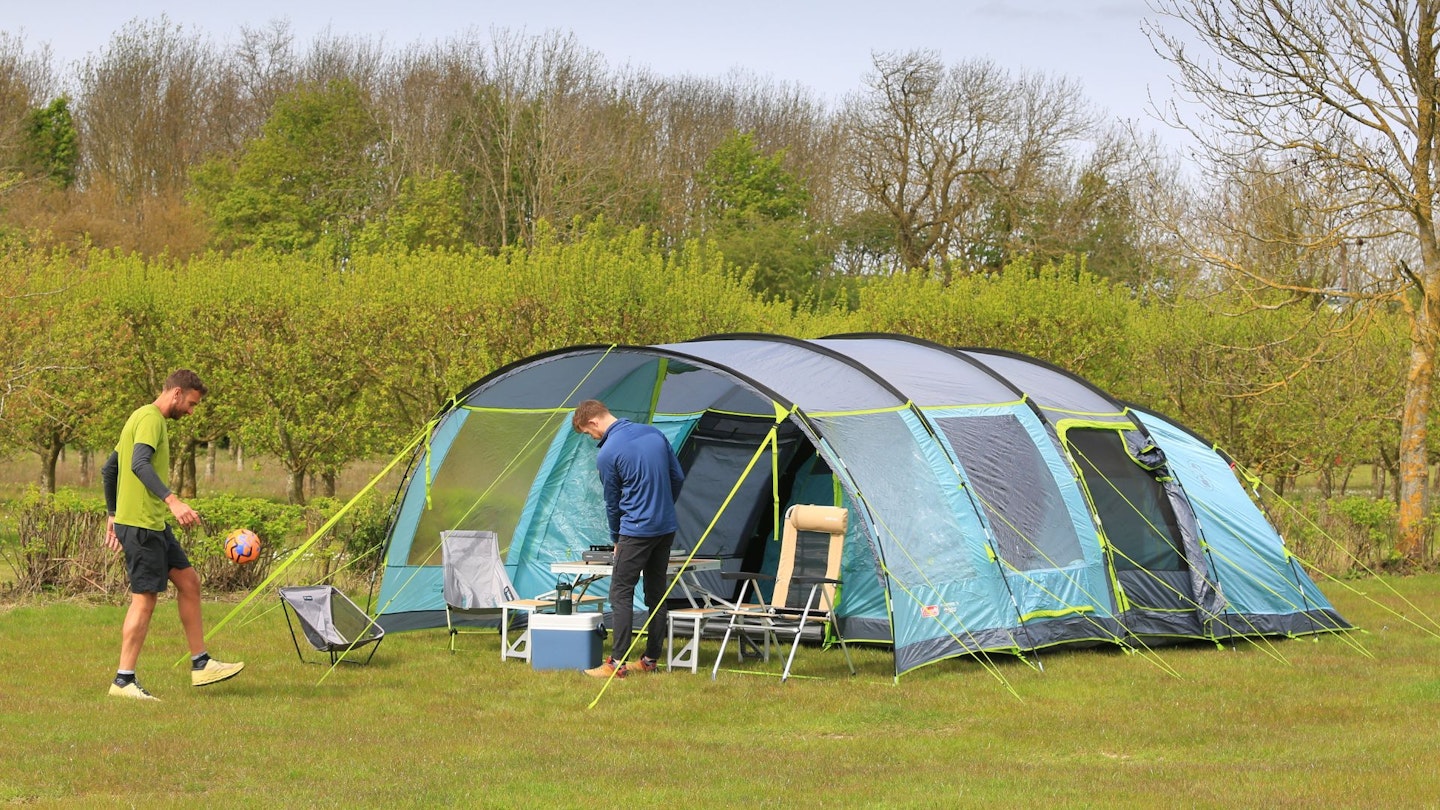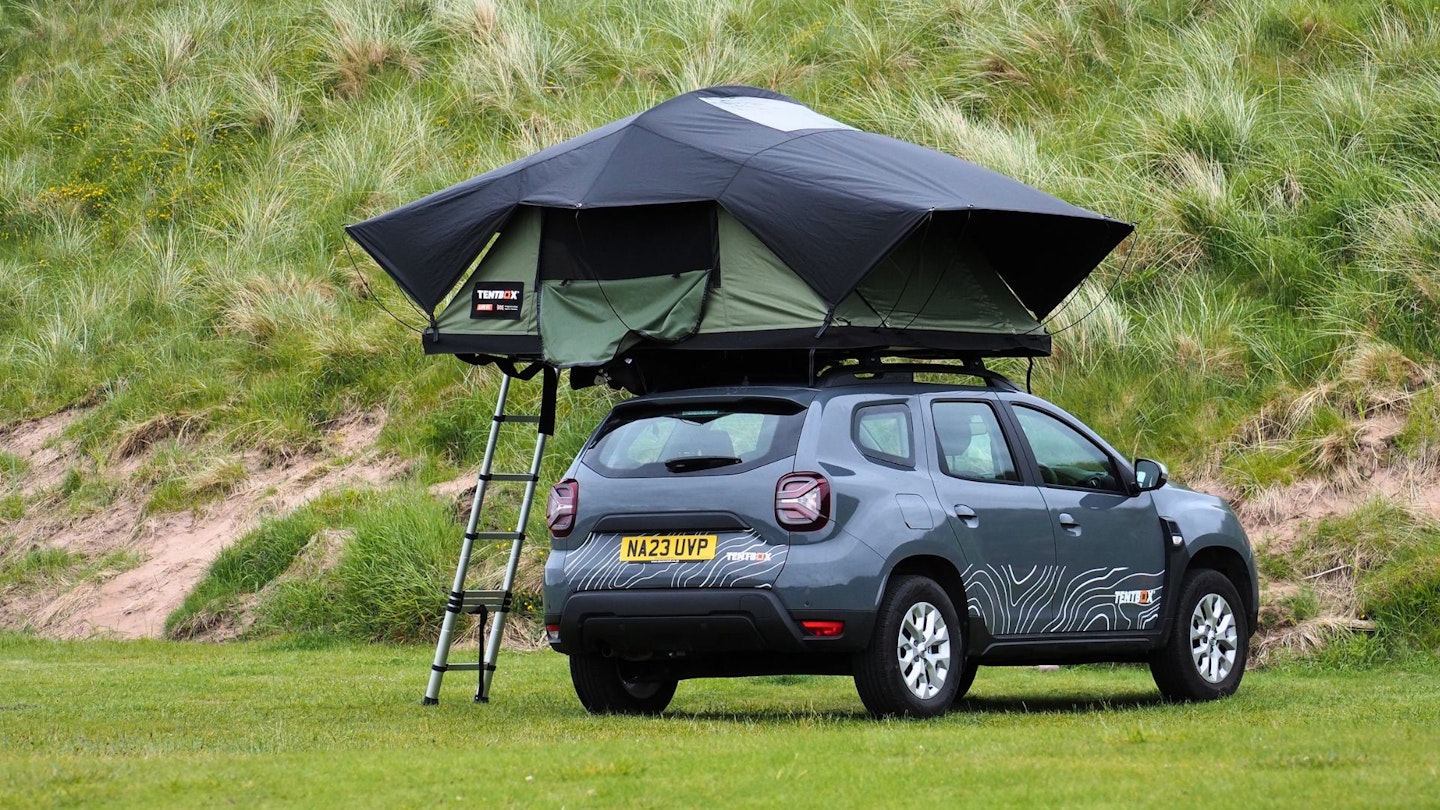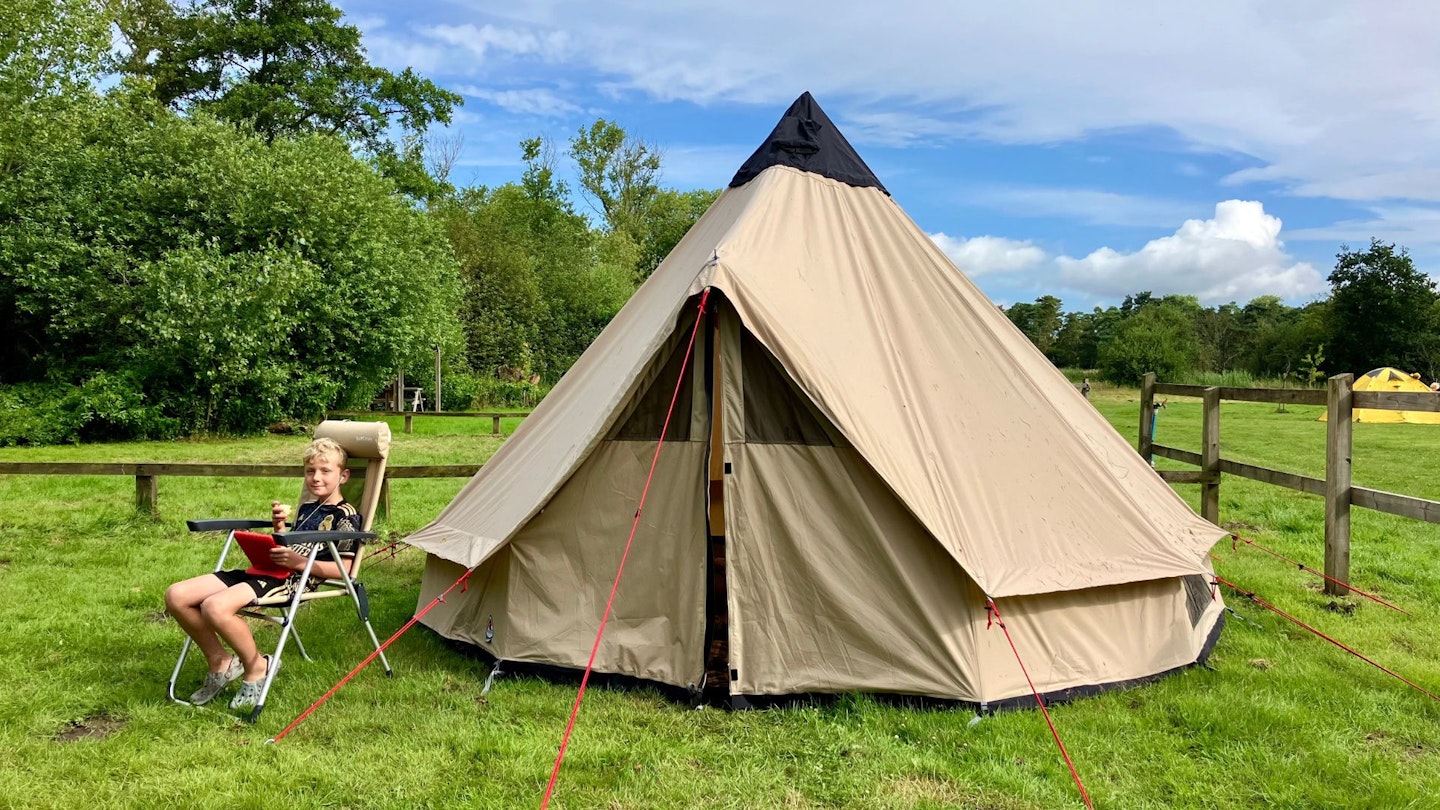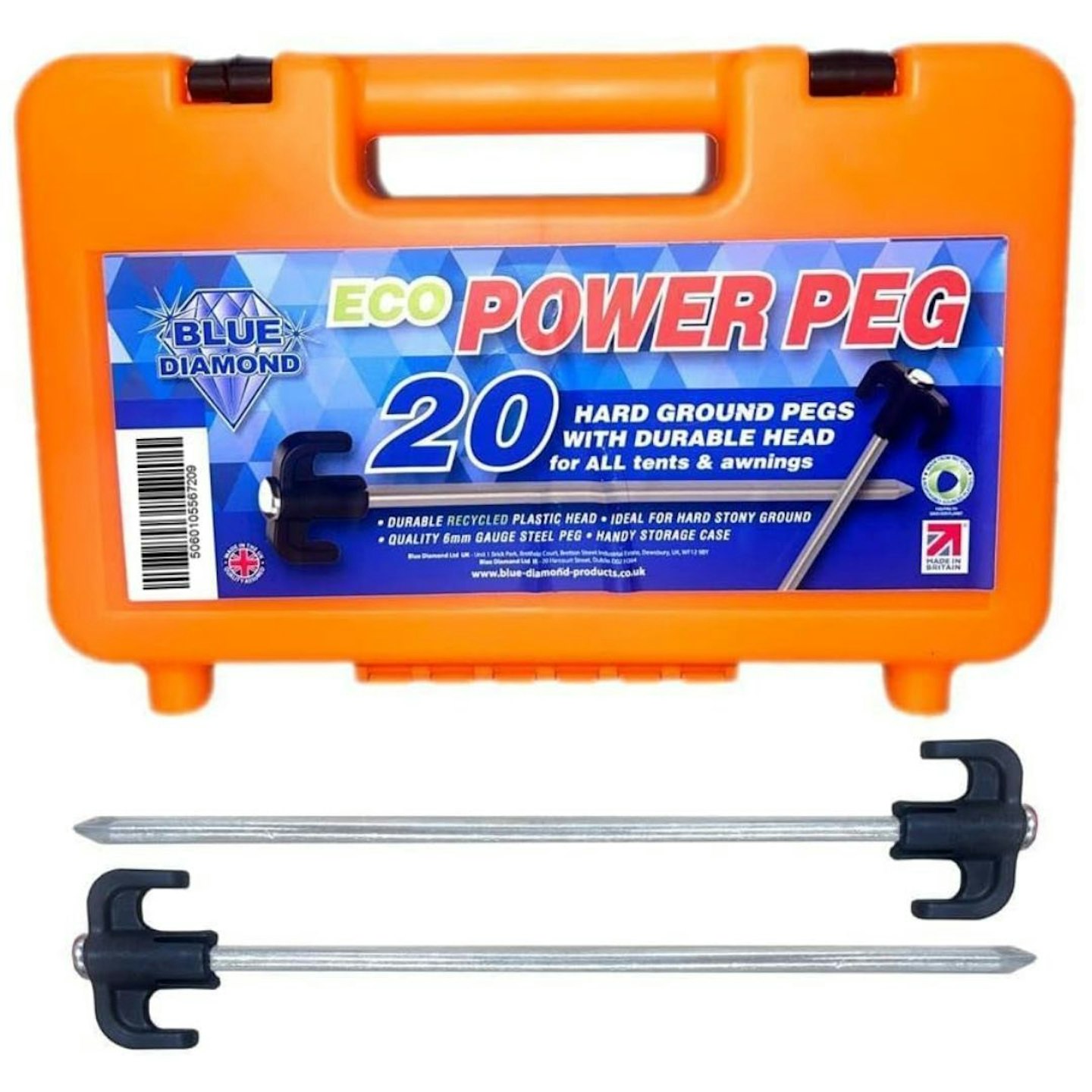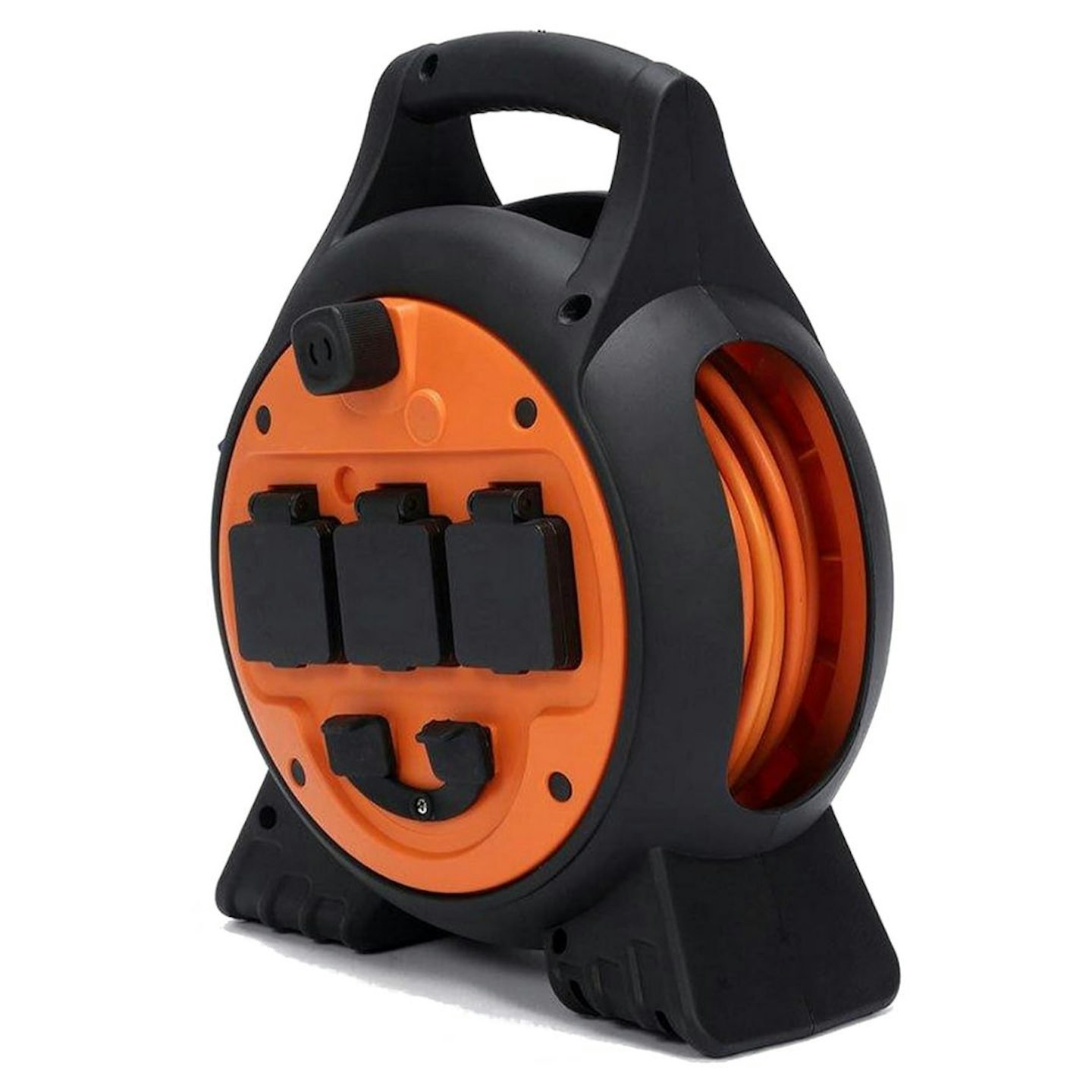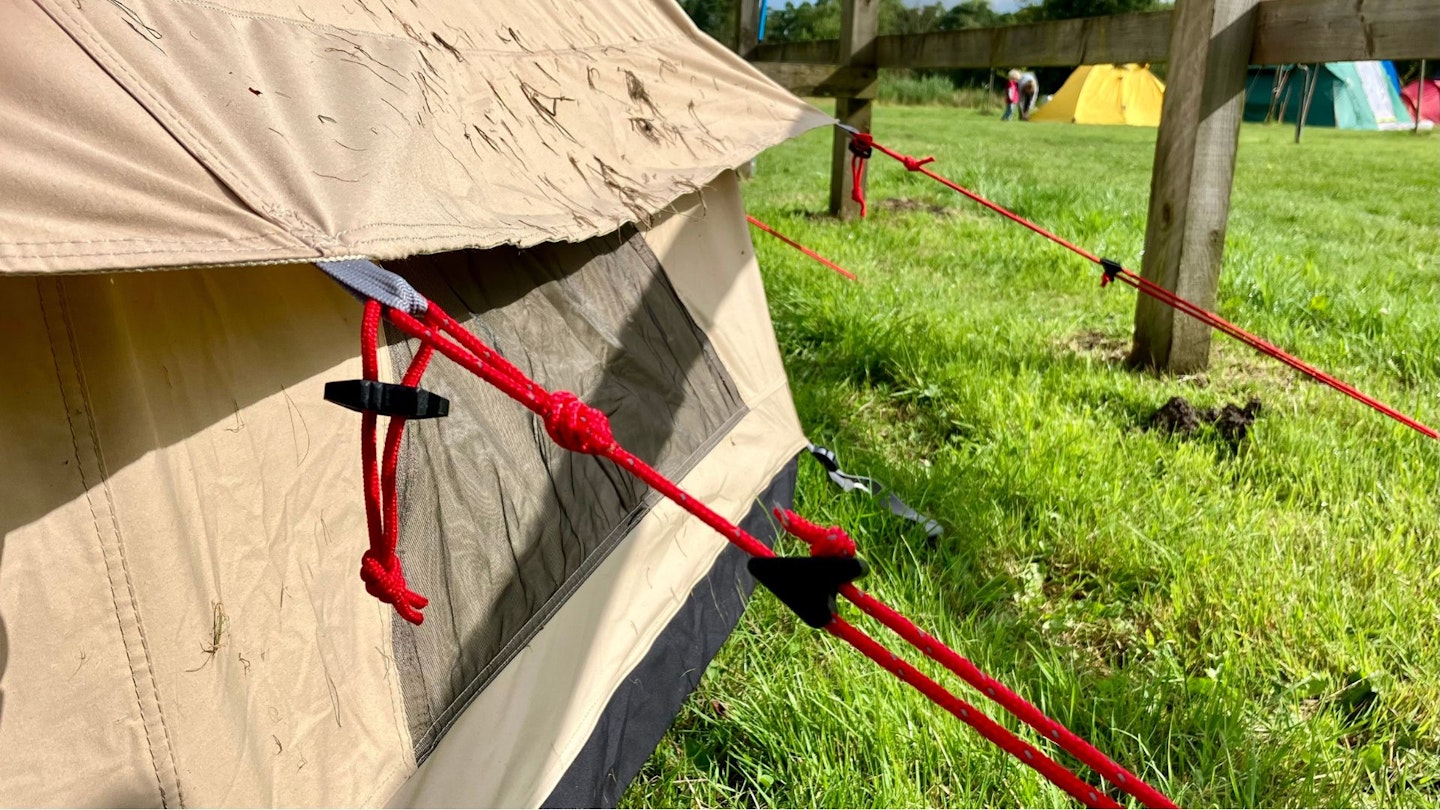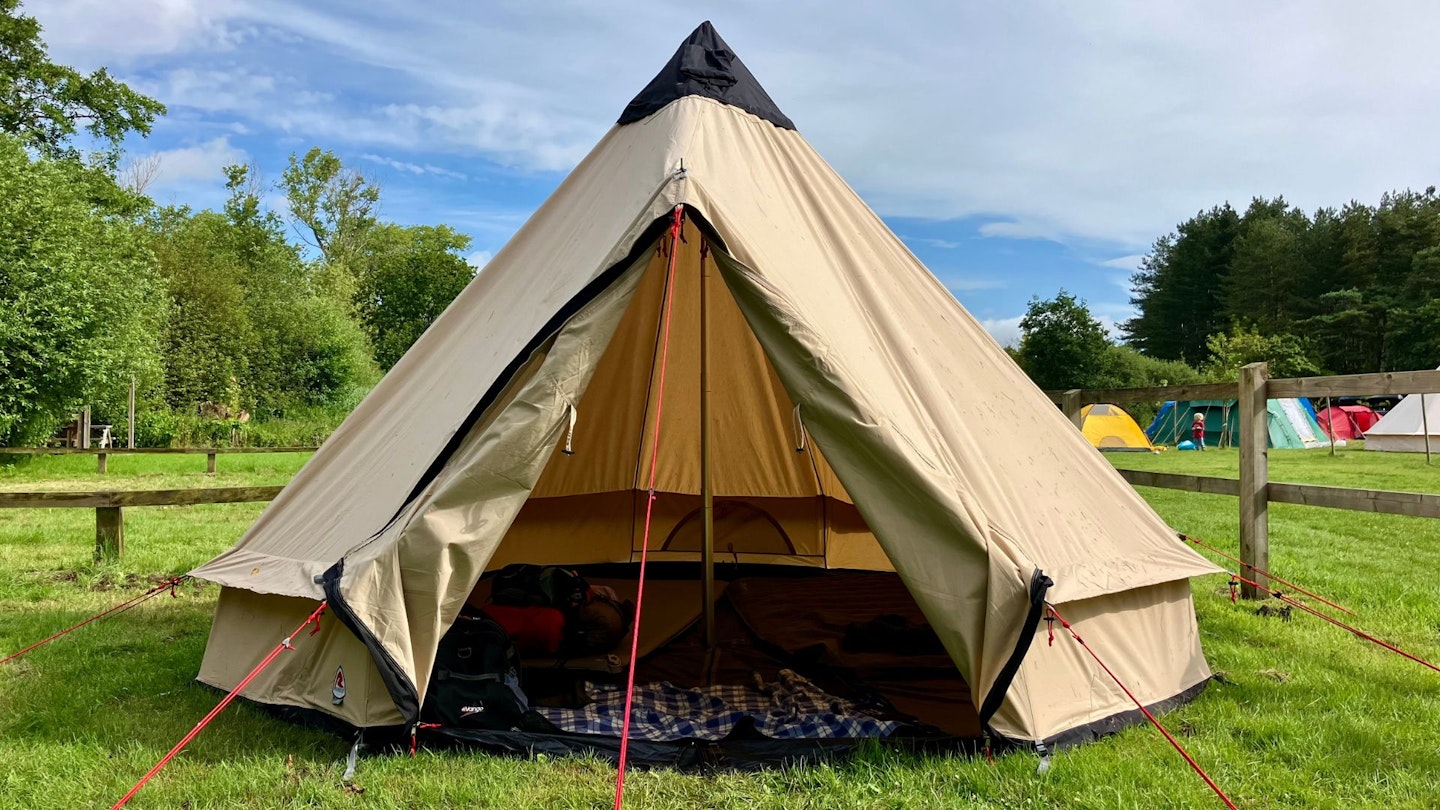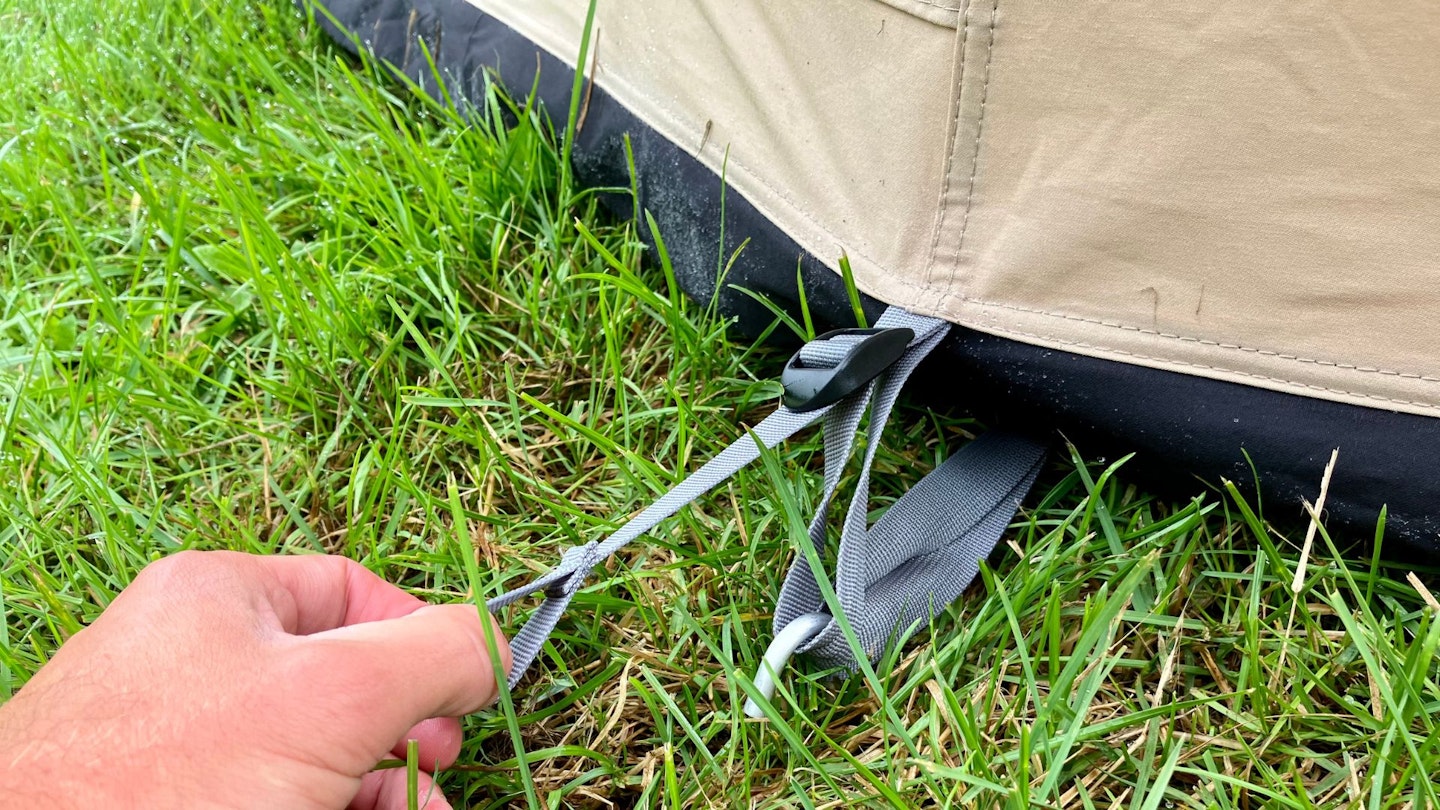When it comes to testing and recommending tents, our LFTO testing team are the best in the business. We're a bunch of hikers, backpackers, mountaineers, outdoor enthusiasts and – crucially for family tents – people with families who spend many of our spring and summer weekends pitching big tents with our partners, kids, and friends.
We know that searching for a new family tent is exciting but can also be a headache, even for those who have owned one before. There are so many excellent tents with never-ending ranges of features all vying for your attention… and hard-earned money.
Each year we undertake the substantial task of testing and reviewing the latest tents ranging from 4 to 8-person models, so we can find the very best models for family camping trips. And trust us, it isn't easy. But pitching, sleeping in, and then packing away all those tents allows us to compare them on everything from features, living space and price, to how easy they are to stuff back into the bag once we've taken them down.
A family tent is a great investment that should last you for many years to come, so scroll down for our shortlist of the best family tents for 2025, then keep reading for our full reviews.
How we tested the best family tents
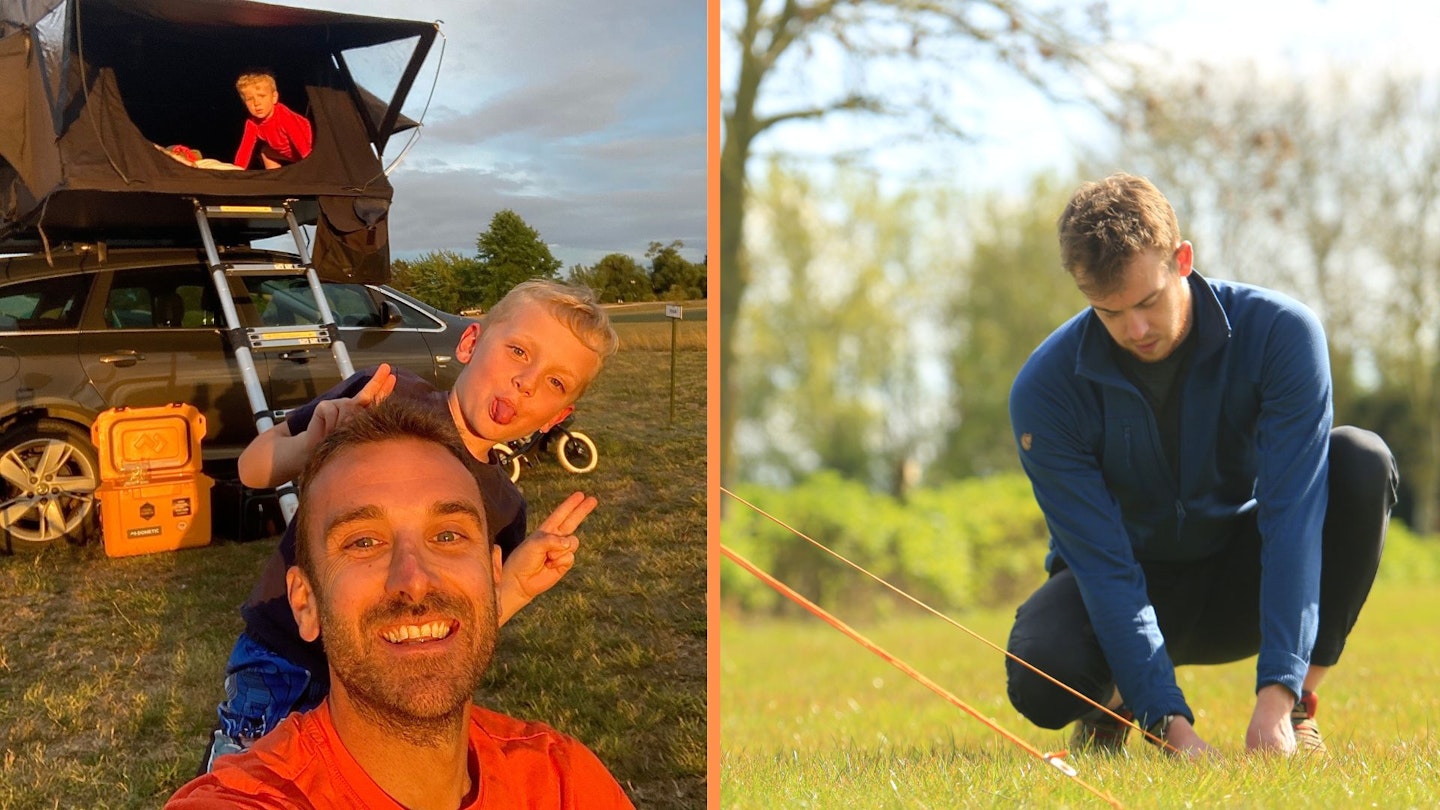
The LFTO team is made up of true outdoor gear experts and enthusiasts (you could even call us geeks) who not only spend many days and nights on mountain treks, but also have lots of experience using and testing family tents and all the latest camping gear and gadgets. Many members of our team have young children, and all of us camped with our parents as kids so have plenty of opinions on what makes the best family tents.
The tents recommended below were tested by our editor Oli Reed and senior writer Chris Williams (above). Oli spends many (if not most) of his spring, summer, and early autumn weekends camping with his two young boys, and Chris spent most summers on family camping trips when he was growing up in New Zealand. He also has several years experience as a journalist working in the outdoor industry.
Read more about how we test gear HERE.
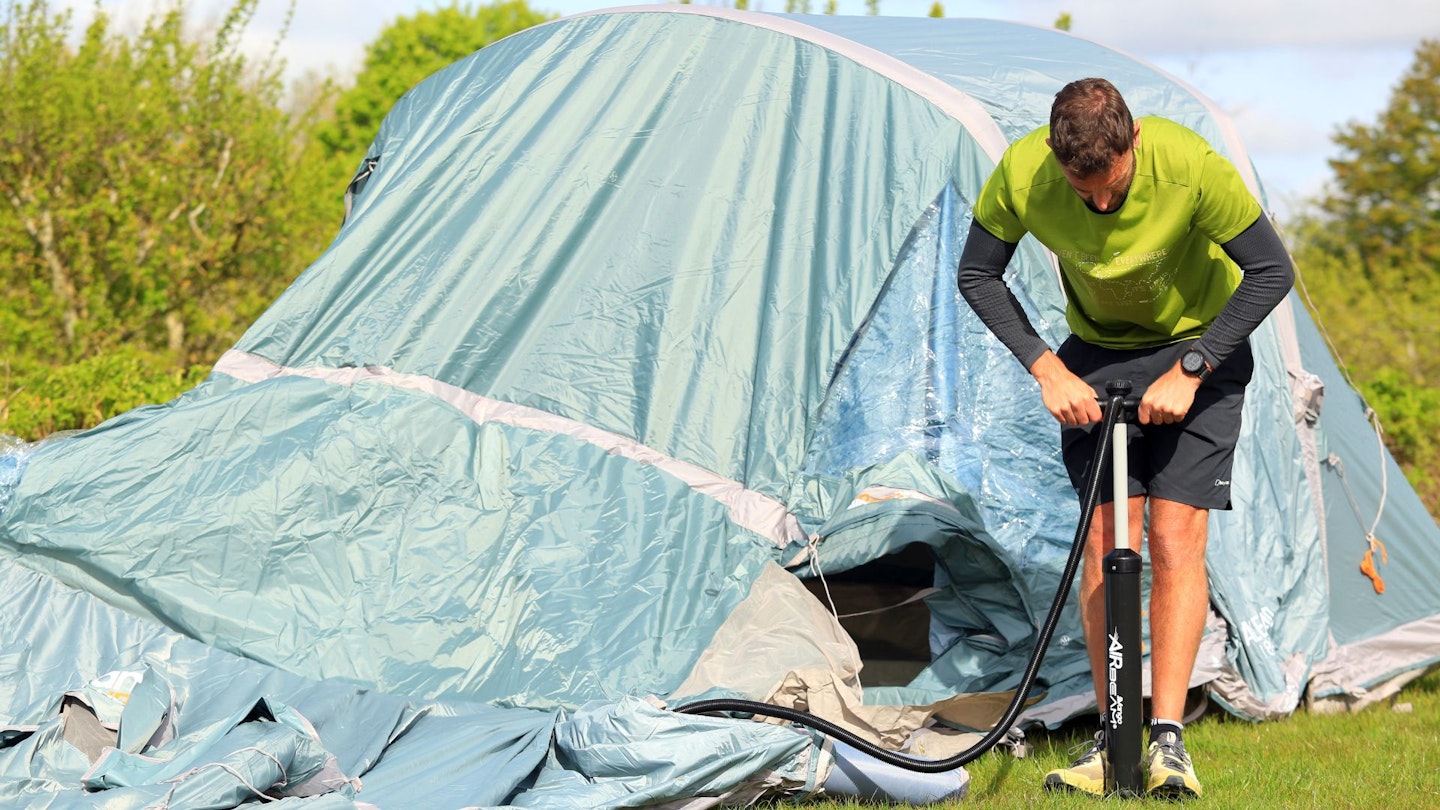
Our picks of the best family tents have each received an individual award be it value for money, clever design, or space. If you want to learn more about which tent is right for you, scroll to the bottom of this article to find our buying advice.
When camping as a pair, we often like to be cheeky and pitch a three-person tent for that extra room. The same idea can also apply for a large group – some of these five- or six-person options are also brilliant picks for a family of four with a load of gear and a giant cool box to store.
Best family tents reviewed:
Of all the family tents we've tested at LFTO, this one ticks the most boxes in terms of the way it looks, the way the layout works for kids and parents, and the way it feels like you're investing in something you'll be using on many camping trips for many years to come.
Everything about the Eagle Rock feels premium, from the aluminium poles and door toggles to the fabrics and the taped seams. The design is also quite understated, with the green and beige colours making it blend in nicely to the landscape on any campsite.
The colour scheme and quality combines to offer superb liveability. The living space is generous in both floor area and height. It's simply a very nice place to live while camping.
Like everything from Robens, the Eagle Rock 5XP feels very durable and premium, that's also reflected in the high price, but this feels like money well spent if you want a tent that's going to last a long time and join you on many family camping adventures. The porch area is large, the features are plentiful, and there are two large entrances. We can't pick many faults in it at all.
Read our full Robens Eagle Rock 6+2XP review
Pros
- Excellent weatherproofing
- Lots of internal space and headroom
- Adaptable bedroom setup
- Superb quality materials
- Feels very durable
Cons
- Takes up a lot of car boot space
| Type | Tunnel |
| Weight | 23kg |
| Packed size | 85 x 52cm |
| Doors | 3 |
| Vestibules | 3 |
| Inner | 68D polyester 185T |
| Fly | HydroTex HD 75D polyester Taffeta 185T PU coated (5,000mm HH) |
| Groundsheet | Polyethylene (10,000mm HH) |
| Poles | Anodised aluminium |
It's perhaps not too surprising to find a Decathlon tent winning our 'Best Value' award. It's not a given though, due to the fierce competition form rival brands like Colemand and Vango.
What cemented the Quechua Arpenaz 4.1 F&B tent as the best value option for us was that it had its prorities straight. A value-oriented tent has to focus on quality and practicality above all else, and that's what we found the Quechua Arpenaz 4.1 F&B does so well.
It's fairly modest size, measuring 4.6m x 2.6m, but we found it still manages to provide a bedroom with 60cm of width per person, which is pretty typical – this, in addition to a 5m2 living space.
In our group test, which included much larger family tents, it wasn't the size that we felt was a weak point here. With 200mm HH waterproof rating and rated up to winds of 50kph (30mph), the Quechua Arpenaz 4.1 F&B is only suitable for mild conditions. Within its limits we think it's a well made tent, it's just that its limits are certainly lower than those costing a bit more.
We liked that the Quechua Arpenaz 4.1 F&B packs down quite small and isn't very heavy. Overall, we felt it's a great first tent for a family or option for those after an affordable but well made and comfortable camping tent for summer.
Read our full Decathlon Quechua Arpenaz 4.1 F&B review
Pros
- Very well priced
- Stable and well made
- Not overly large or bulky
- Comfortable living space
Cons
- Blackout bedroom is fixed to floor and fiddly to unclip
- Fly could have a better waterproof rating
| Type | Tunnel |
| Weight | 11.5kg |
| Packed size | 60 x 30cm |
| Doors | 1 |
| Vestibules | 1 |
| Inner | Polyester |
| Fly | Polyester (2000mm HH) |
| Groundsheet | Polyethylene |
| Poles | Fibreglass |
British camping brand OLPRO was established in 2011 because its founders thought the industry didn't offer value-oriented tents and camping gear that also focused on sustainability.
Indeed, this OLPRO model we tested, the 4-person Blakedown Breeze air tent, stood out among similarly priced rivals in our group test for its eco credentials. It's made using a durable and UPF50+ rated recycled material called OLTECH RE-PRO 150D, which OLRPO uses on all its Breeze products. Beyond this, OLPRO is one of the few camping brands to be a certified B Corp and has a range of initiatives to make it more sustinable such as taking back used products to refurbish and resell, and providing spares for its products to boost their usable life.
But we found the OLPRO Blakedown Breeze 4 is also a well thought out family tent too. It has very spacious living space for a 4-person model. We also liked how easy it was to pitch (a trademark of inflatable tents), and its above average weatherproofing.
Its flysheet waterproof rating is the same as premium Robens tent that won our Best in Test award. The OLPRO tent has thicker storm straps all-round instead of thinner guy lines, which we found really boosts its stability.
Areas of improvement, we think, are around ventilation. None of the windows have mesh panels, so the only way for fresh air to get in is through each door or via the small bedroom air vent. It's also very bulky when packed down, being even larger than the six- and eight-person tents we tested.
Read our full OLPRO Blakedown Breeze 4 Berth Inflatable Tent review
Pros
- Easy to pitch
- Good flysheet waterproof rating
- Relatively sustainable
- Well lit living space
Cons
- Could have better ventilation
- Very bulky when packed down
| Type | Tunnel |
| Weight | 30kg |
| Packed size | 90 x 50 x 50cm |
| Doors | 2 |
| Vestibules | 1 |
| Inner | Polyester |
| Fly | Recycled OLTECH RE-PRO 150D Oxford (5000mm HH) |
| Groundsheet | Polyethylene |
| Poles | Inflatable |
The tunnel shape is the go-to approach for family tent design, and with good reason because it's a reasonably stable shape that also offers better internal space than a dome shape, for example.
Most tunnel shaped family tents are oriented lengthways with rooms behind one another, but the Vango Castlewood Air 800XL is oriented widthways. What we liked about this arrangement is that it gives campers seperate bedrooms, one at each end, which gives people more of their own sleeping space without increasing the size of the tent.
On test, the Vango felt well made and quite sturdy compared to other large tents of a similar price. It was also easy for us to pitch, thanks to inflatable poles. It was, however, a bit of a faff to get all the air out of the poles when packing it away, taking over 10 minutes and two attempts to get in to the bag.
It also would've been good to have a double entrance on at least one side. There are doors on each side of the central living space but they're both single entry only and doesn't have such a great indoor-outdoor flow.
There are quite a few features, such as removable light-blocking bedroom inners with dividers and a special slit in the wall for a power cable. The 'Package' part of the name also means this tent comes with a footprint to put under the groundsheet for protection against damage moisture. However, it lacks dedicated storage options.
Read our full Vango Castlewood Air 800XL Package review
Pros
- Separated bedrooms
- Removable blackout bedrooms
- Spacious living area
- Well priced
- Quite study and weatherproof
- Very easy to pitch
Cons
- Bedrooms could be a smidge bigger
- Relatively light on features
- Doesn't use recycled fabric
- Can be a challenge to pack away
- Very large packed size
| Type | Inflatable |
| Weight | 25.6kg |
| Packed size | 80 x 44 x 48cm |
| Doors | 2 |
| Vestibules | 1 |
| Inner | N/A |
| Fly | Sentinel Fabric (3000mm HH) |
| Groundsheet | Polyethelyne |
| Poles | Vango AirBeam |
Coleman's Meadowood 6L BlackOut Tent looks like an aircraft hangar, and we found it's about as spacious as one too. Key to this is its width. At over 4m across, the Meadowood 6L BlackOut Tent is considerably wider than many of the other family tents we had on test and it really paid dividends for internal space.
The central living space is cavernous with a 11m2 floor area, which extends to 16m2 when you include the porch space. We found that having windows on every panel and a 2.1m ceiling height throught the full length of the living space and porch also helps a lot with the feeling of spaciousness. The bedroom too - featuring Coleman's BlackOut fabric - gives each occupant (if filled to its 6-person capacity) 65cm of width, which was a little more than the 60cm we got in most of the family tents we tested.
We were pleased to see that the Meadowood 6L BlackOut Tent flysheet has a waterproof rating of 4000mm HH, which is higher than the 3000mm HH seen on many tents of this type. The Meadowood 6L BlackOut Tent also has storm straps at the front and rear of the tent in addition to guy lines to help secure it in windy conditions. Interestingly, however, we thought some of the fabrics and components were of a slightly lesser quality than those found in some comparable tents we tested.
With an RRP of £700 and widely available at a discounted price, we think the Meadowood 6L BlackOut Tent is good value for such as spacious family tent. Owners will also be pleased to know that Coleman has partnered with a number of businesses in the UK to provide repairs and spares.
Read our full Coleman Meadowood 6L BlackOut Tent review
Pros
- Cavernous living space
- Affordable (and widely available discounted)
- High waterproof rating for flysheet
- Well lit and practical layout
Cons
- Overall quality isn't especially high
- Could have better eco credentials
| Type | Tunnel |
| Weight | 25.8kg |
| Packed size | 75 x 39 x 39cm |
| Doors | 2 |
| Vestibules | 1 |
| Inner | Polyester |
| Fly | Polyester w/ PU coating (4000mm HH) |
| Groundsheet | Polyethylene |
| Poles | Fibreglass |
With the Thrymheim 5 PU, Nordisk has rather cleverly taken the concept of a tipi tent and tweaked it to improve liveability, and we were super impressed with the results.
Instead of using the traditional central pole approach, the Thrymheim 5 PU has two that create an upside down 'V' as the main frame. We found that you get the double benefit of increased headroom compared to standard tunnel-shaped tents without an annoying pole in the middle of the room.
We loved the amount of internal space you get considering its reasonably modest footprint of 3 x 4.4m. The living space can be kept as a single space inside the flysheet, or you can attach the inner bedroom. It therefore serves as both a great family camping tent and a basecamp tent for groups.
It also packs down to a pretty compact size and is relatively lightweight for a tent of this size (10kg). Despite the low weight, the materials used are very high quality, especially the main poles, which are large aluminium jobs. Our only quibble is that the pegs could probably be steel rather than aluminium for extra strength.
Read our full Nordisk Thrymheim 5 PU review
Pros
- Remarkably spacious
- Pitches outer first
- Loads of headroom
- Multiple layouts for vestibule
- Relatively lightweight and compact
- Smaller version also available
Cons
- Only two small windows
- Pegs could be stronger
| Type | Tipi |
| Weight | 10.2kg |
| Packed size | 57 x 25cm |
| Doors | 1 |
| Vestibules | 1 |
| Inner | Polyester w/ No-See-Um mesh |
| Fly | Polyester w/ PU coating (3000mm HH) |
| Groundsheet | 150D polyester w/ PU coating (8000mm HH) |
| Poles | Aluminium |
Go back in time a few years, and hardly anyone had heard of a roof tent, but now, all of a sudden you can't drive down a motorway without seeing one every few miles. There are quite a few roof tent brands springing up now, but TentBox still seems to be leading the way in terms of popularity.
We've been using the first instalment of the Tentbox Lite – now known as the Tentbox Lite 1.0 – for a couple of summers, and not only is it a fantastic option for couples, but it also doubles up as a good family tent for two parents and one small child (or one parent and two small children) due to its king size mattress. But then, in 2023, along came the Tentbox Lite XL, aimed directly at the family camping market due to its 4-person capacity with a sleeping area of 240 x 183cm.
By now, you probably know the basic appeal of a roof tent. You attach it to the top of your car like a roof box, with the mattress and sleeping bags already inside it. Then simply pop it open when you reach your campsite, drop the telescopic ladder, then climb in. They make camping brilliantly simple and are just as easy to fold down and pack away when you're ready to leave.
The Tentbox Lite XL certainly isn't cheap, but it's brilliantly engineered, extremely durable, and could save you a fortune over the years if you choose it instead of a campervan. You also get two skylights, a dual-layer memory foam mattress, and a 'flat-step' ladder that's covered by a new annexe design to make climbing in and out safe, dry and simple. Plus, of course, you can park up and pitch this tent anywhere, making it the standout option for spontaneous family camping adventures.
Read our full TentBox Lite XL review
Pros
- Pitches in seconds
- High-quality materials
- Memory foam mattress
- Very spacious interior
- Two skylights for stargazing
Cons
- Bulky to store when not in use
- No porch or living area
| Capacity: | 4 |
| Bedrooms: | 1 |
| Weight: | 62kg |
| Sleeping area: | 240 x 183cm |
| Packed size: | 70 x 35cm |
| Max internal height: | 115cm |
| Inner: | Waterproof canvas fabric (3,000mm HH) |
| Fly: | Waterproof canvas fabric (3,000mm HH) |
| Groundsheet: | N/A |
| Poles: | Aluminium |
The Scandinavian Klondike may not adhere to the classic family tent look but that's all for the better, we think.
Like the Nordisk Thrymheim above, this is a teepee-style tent. It stands well over 3.5m tall and measures nearly 4m across, and as a result, the internal space is fantastic (large enough for two double airbeds with loads of room leftover).
The light coloured polycotton fabric is durable and breathable, and wall vents help keep the inside of the tent well ventilated too. Sure, you don't get the seperate bedrooms like you might with tunnel shaped tents, but flip side is that the single large room inside the Klondike is extremely versatile and spacious.
Although we like the style and liveability of the Klondike, our very favourite thing about it is the ease at which it pitches. It's a case of pegging out the tent and rasing the central pole, which can all easily be done by one person. Find us a typical family tent that's as easy to pitch as this one.
There's no denying it's expensive, but we still think it's good value. Hiring a glamping tent like this costs a fair bit, so the Klondike quickly pays for itself that way, and it is such a quality item (like so many Robens products), and feels so much more durable than many 'maintream' family tents.
Read our full Robens Klondike Tent review
Pros
- Stylish bell tent design
- So simple to pitch
- Packable and portable
- Huge living area
- Excellent weatherproofing
- Superb quality materials
Cons
- No obvious sustainability credentials
| Type | Bell tent |
| Weight | 16.7kg |
| Sleeps | 6 (but we think it's perfect for 4) |
| Packed size | 80x27cm |
| Doors | 1 |
| Bedrooms | 1 |
| Fly | HydroTex Polycotton (65% polyester / 35% cotton), 5,000mm HH |
| Groundsheet | 210T Oxford polyester (10,000 mm HH) |
| Poles | Aluminium anodised 30.8-52 mm centre pole, plus 22 mm A-frame pole in doorway |
A few years ago, we got our hands on the Coleman Octagon, which was great fun for sleeping out with kids in warm summer weather and for using as a garden play tent, but never really felt like a serious piece of camping kit. The launch of the updated Coleman Octagon range in 2023, however, seems to have moved things on a lot. This one feels like a cross between a glamping tent and a fully sealed gazebo.
The Octagon is still very much a high summer camping tent, but then if you're camping as a family that's probably when you're most likely to use it anyway. The colour-coded steel and fibreglass pole design makes the frame very simple to pitch, with a sewn-in bathtub-style ground sheet making the base water-tight. It feels incredibly spacious inside, with just one big octagonal room (not just a clever name) and a fairly consistent internal height, which peaks at 215cm in the centre. So it's a good option for taller campers.
The real beauty of the Coleman Octagon range, though, is the panoramic views it offers. The flysheet goes on after the rest of the tent has been constructed, so on a warm and clear night, you can leave it off completely for full 360 views showing off your surroundings and the night sky. The mesh inner will keep the bugs away, but otherwise you'll feel completely absorbed in nature. Or if you're not feeling quite that brave, simply roll back the windows top open it up on all eight sides to get the views.
The hinged door is a nice touch, and the fact this is an 8-person tent means it's a good option for bigger families. Although with just one room inside, you'd better make sure you all like sleeping in tents together before committing to a weekend away! Rather than 8 people, we'd say the Coleman Octagon is more perfectly suited to a family of four.
Read our Coleman Octagon First Look
Pros
- 360 views from inside
- Easy to assemble
- Good internal height
- Clever hinged door
- Very spacious
Cons
- Only one room
- Fairly bulky and heavy
| Capacity: | 8 |
| Bedrooms: | 1 |
| Weight: | 20.7kg |
| Sleeping area: | 15.7m² |
| Packed size; | 85 x 30 x 30cm |
| Max internal height: | 215cm |
| Inner: | Breathable polyester, Polyester PU coated, No-see-um mesh |
| Fly; | Polyester, Polyester PU coated, Fire retardant |
| Groundsheet: | PE, welded, fully integrated |
| Poles; | Steel and fibreglass |
How to choose your family tent
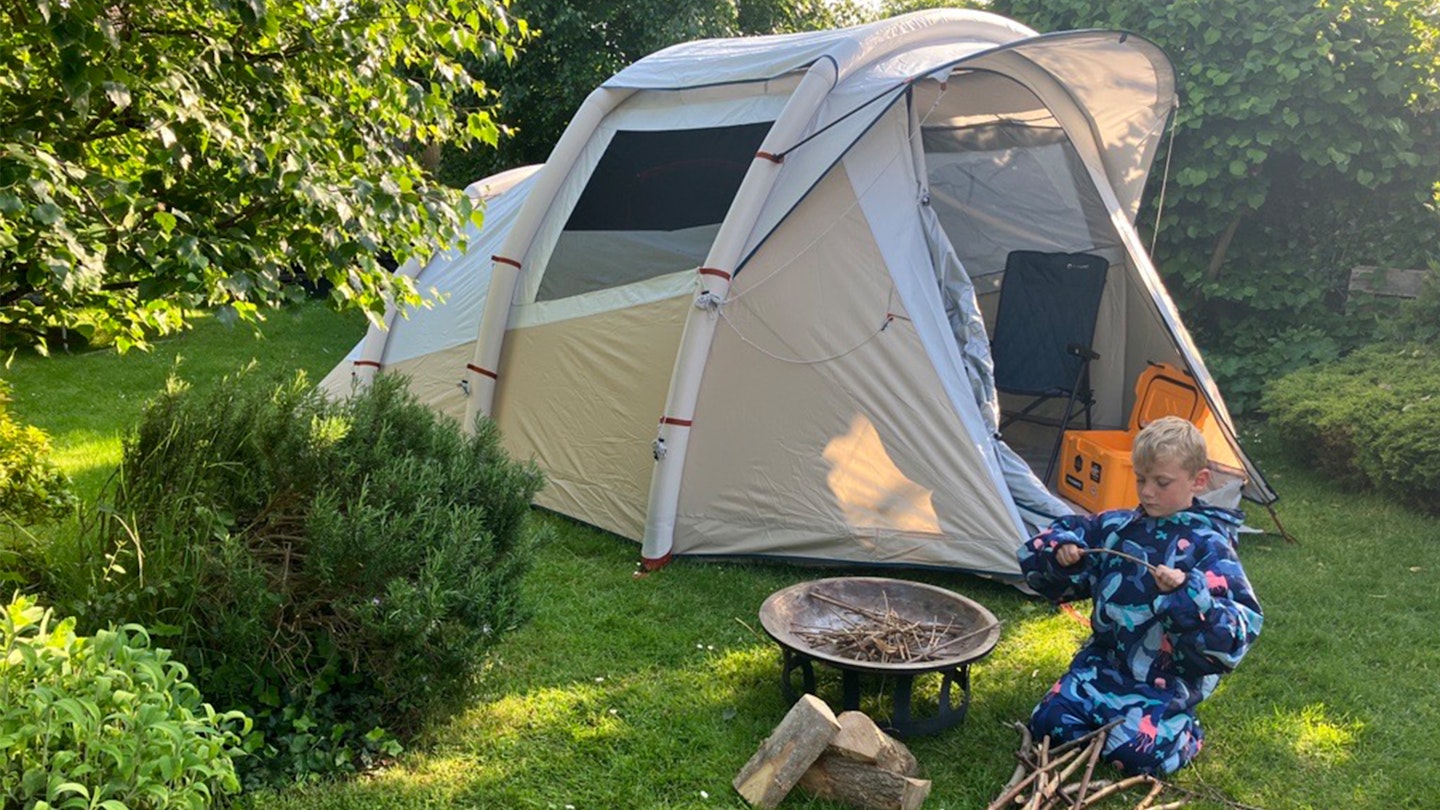
What sort of camper are you?
Consider your aims and experience level. If you're a first-time camper, it's worth purchasing a beginner's tent that isn't too complicated ro pricey just in case the camping life isn't for you.
On the flip side, if you do have some outdoor experience, then be sure to go for a tent that suits the way you and your family like to camp. If you prioritise space or luxury, there are plenty of tents to suit.
Similarly, if you're the type of camper who takes the bare essentials, keep things simple with a more basic option.
Weight and packed size
Are you a camping minialist or more of a glamper? Will your tent go up right by your car, or will you have to carry it a distance? These are all good questions to answer before looking for your family tent.
No family tents are particularly small or lightweight, but there is a huge weight and size range, from around 10kg up to 40kg+. The weight and size are important to check as you'll need it to fit in your car alongside your other gear, and you'll want to avoid lugging around an excessively large tent if you are walking for any distance.
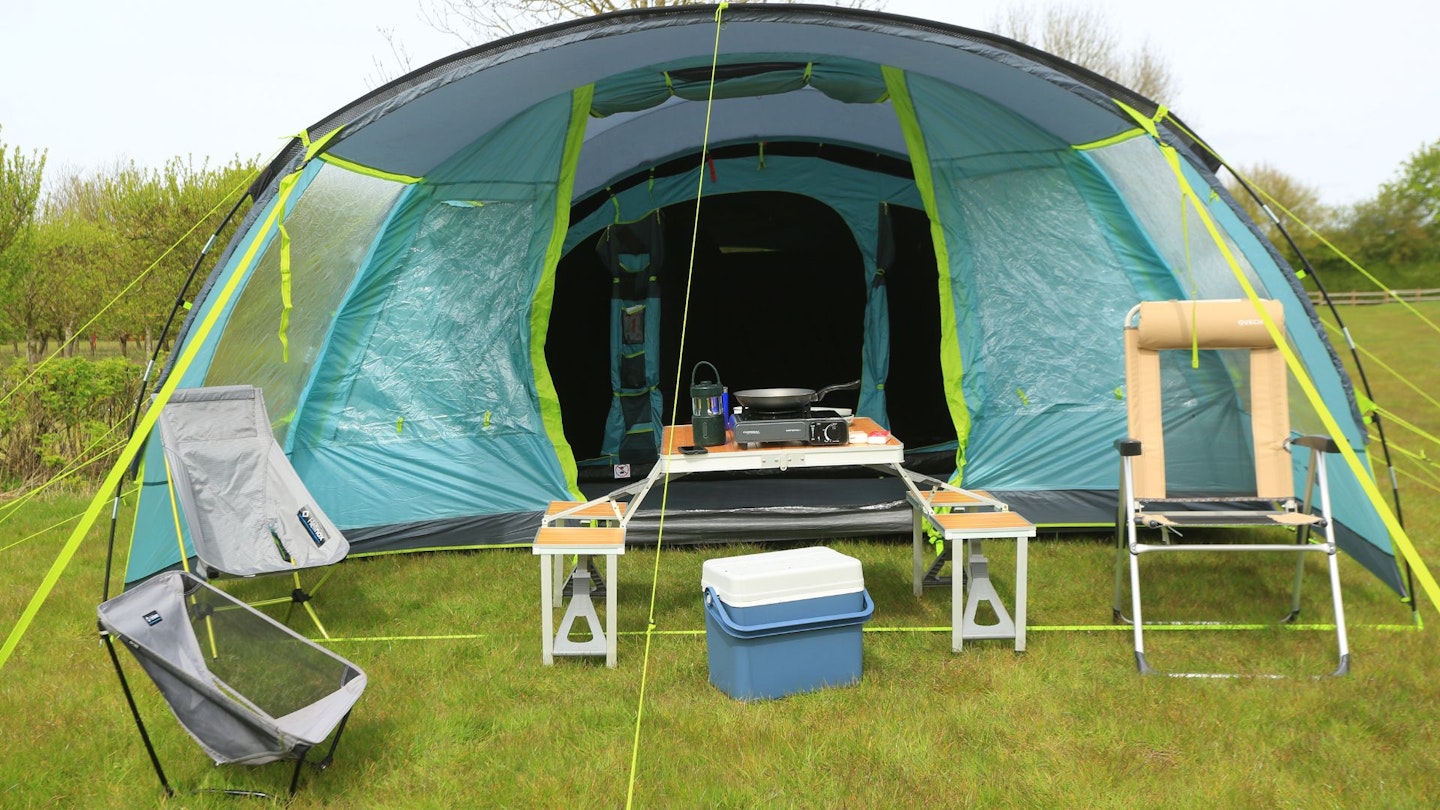
What type/shape of tent is best for a family tent?
To start narrowing down your options, consider what kind of outdoor adventures you're hoping to have, then pick the type of tent that best suits your needs.
Tunnel tents are great for weekend and summer camping as they offer lots of space, are easy to pitch, and can use traditional or inflatable poles. However, they are often heavier than other shapes.
Dome tents are good for hikers and trekkers because small dome tents are quite stable and lightweight. They are also cheap and work well in moderate wind.
Geodesic tents have crisscrossing support poles, making them much more capable of dealing with high winds and harsh weather. Geodesic tents sacrifice space and are a little more complex to pitch than other styles, but are great for camping in extreme environments. Less suitable for casual campers and families.
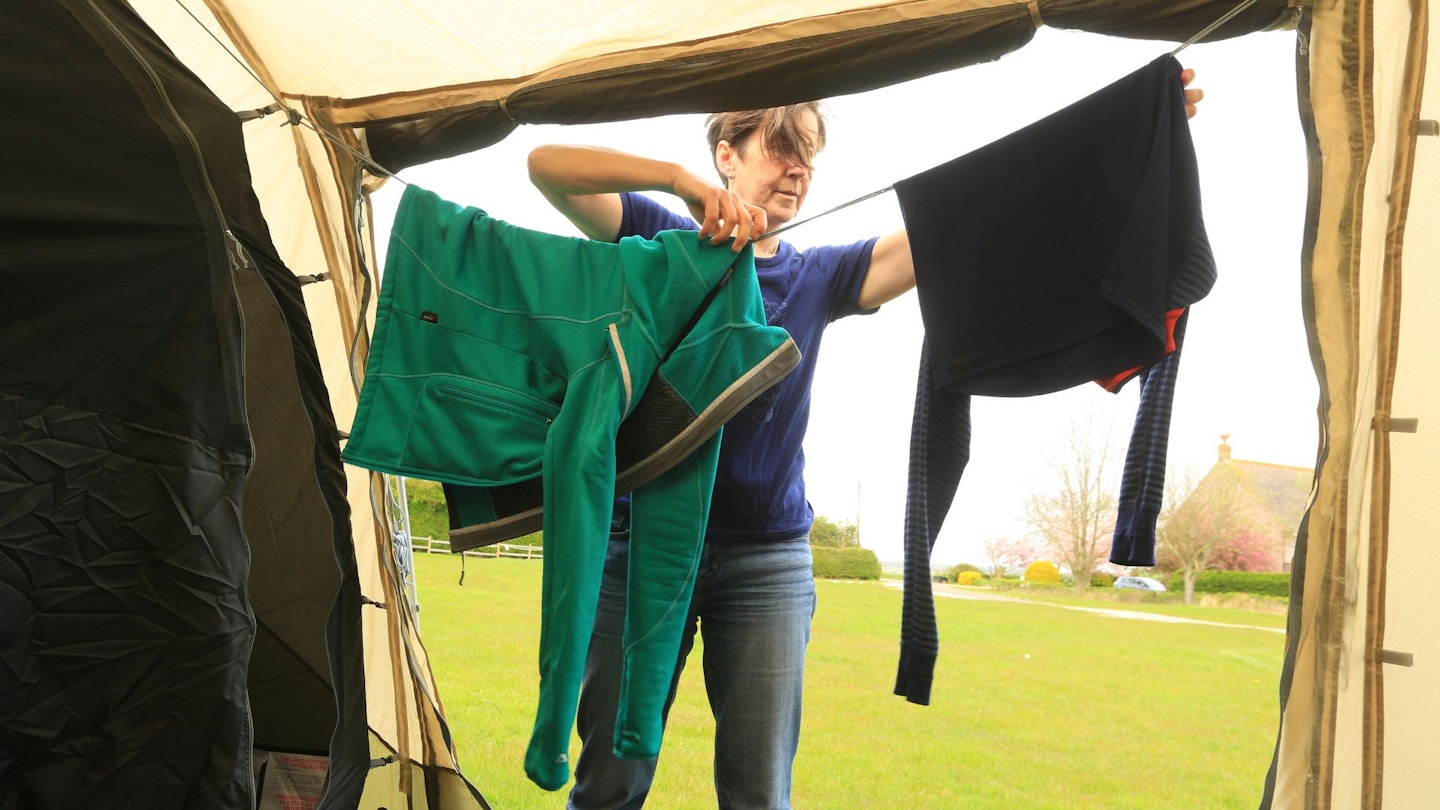
What waterproof rating should a family tent have?
Next, make sure you're familiar with waterproof ratings:
– 1000mm HH: Will keep out light rain. We'd call this rating more water-repellent than waterproof.
– 2000mm HH: Enough to fend off some rain and is the bare minimum you'd want for family tents.
– 3000mm HH: Waterproof and will keep out rain.
– 5000mm HH: Will keep out heavy rain.
– 10,000mm+ HH: These ultra-durable tents deal with driving rain and snow and the extra pressure applied onto tent floors by people and equipment.
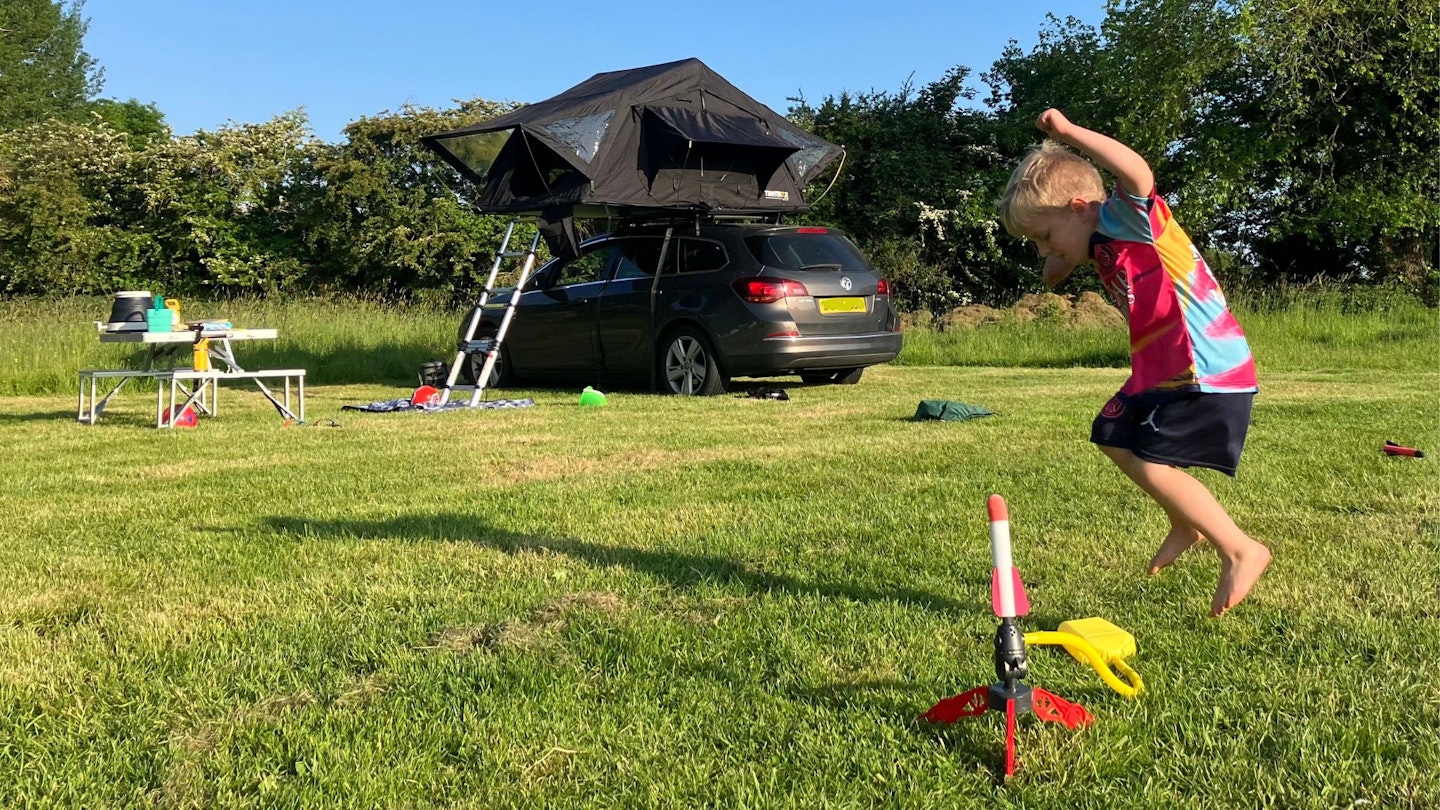
How easy is it to set up a family tent?
Given that most family tents are quite large, it's best to have at least two people to pitch them.
And in order to have the best family camping experience, make a list of items you need to take before you pack.
What materials are best for a durable family tent?
Most family tents use polyester for the main fabric, a thicker groundsheet made from polyethelene, and poles either made from fibreglass or are inflatable.
Perhaps unsurprisingly, the ticker materials offer the best durability (they also make the tent weigh more). So, for the best durability, look for tents that have a polycotton main fabric and, although not essential, aluminium poles.
How do I ensure my family tent is weather-resistant?
In addition to good waterproof ratings (which we've covered above), weather-resistant tents are stable with good anchorage to the ground. You can also boost underfloor waterproofing by using a footprint (an additional groundsheet in the shape of your tent) or tarpaulin.
Extra equipment for family tents:
In order to improve your camping experience, there are some valuable extras that you might want to consider so everything will run smoothly.
Best family tent pegs
Sometimes, supplied tent pegs struggle to pierce hard ground, get pulled from the ground when the weather conditions get really windy or turbulent, or they will bend out of shape over time. You won't need to worry about your tent discharging from the ground with these steel pegs. They are 6mm thick and 200mm long with a sharp pointed end for piercing hard terrain or stones.
Pros
- Durable
- Plastic heads for easy removal
- Sharp point can crack through hard ground
- Comes in a hard case
Cons
- Heavier to carry than regular pegs
Best camping power board
Modern campsites come with all the commodities of home life, and with this socket supply, you will be able to ensure your tent can be fitted with electricity. With the added modern touch of two USB ports, this Hi-Gear plugboard is easy to keep tidy with a roll-up 15-metre cable. It also has three regular UK plugs and makes campsite charging and power supply very easy.
Pros
- Has UK mains plugs and USB ports
- Compact design keeps cables organised
Cons
- Does not contain a battery to store power
How do I clean a tent?
This is pretty easy. Simply get Grangers Tent + Gear Cleaner or Nikwax Tent & Gear SolarWash and clean the fabric as instructed. This helps rid the tent of muck that may hinder its performance and degrade it if left uncleaned. You can follow a step-by-step guide in our article on how to clean a tent.
Periodically, you'll want to reproof the fabric, too (see our guide on how to waterproof a tent for more on that), to maintain its water repellency and protect against UV damage. You can do this with Grangers Tent + Gear Repel UV or Nikwax Tent & Gear SolarProof.
About the author
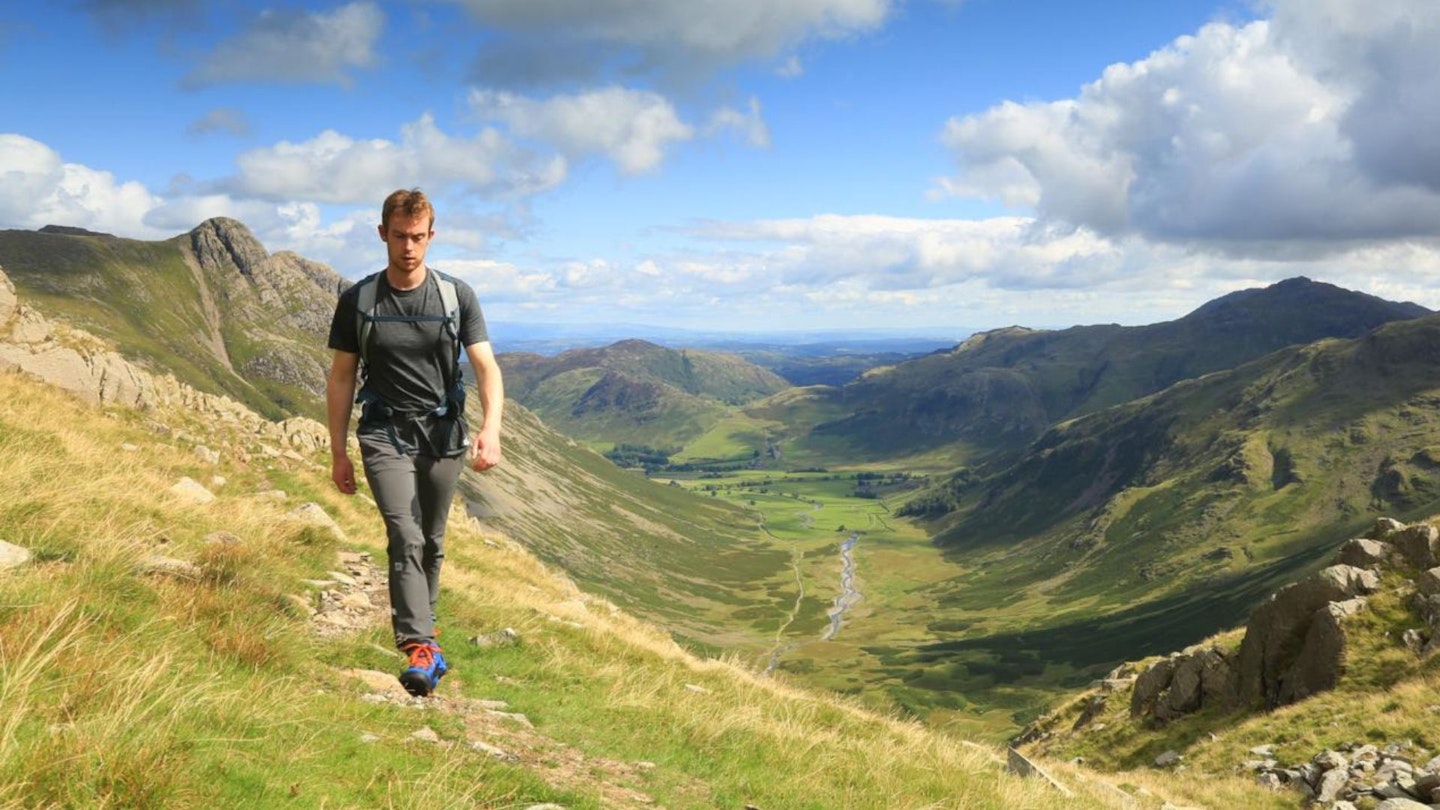
Chris Williams is LFTO's Senior Writer. He has extensive knowledge and experience using large family tents thanks to several years working in the outdoor industry and spending almost every summer camping with family.
